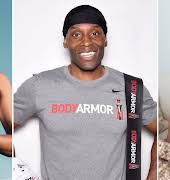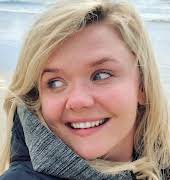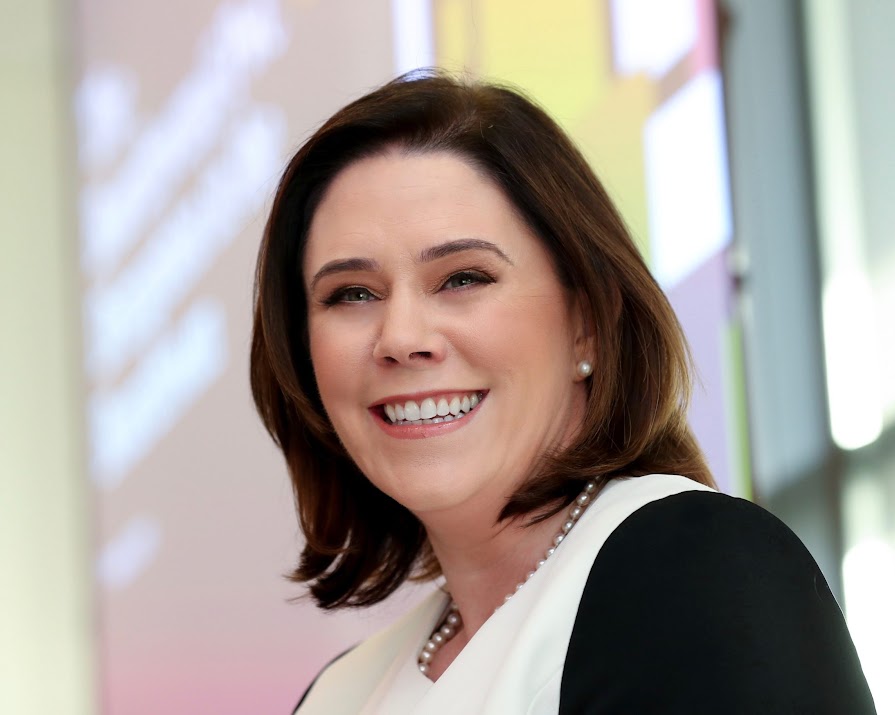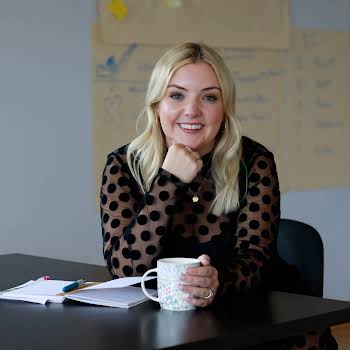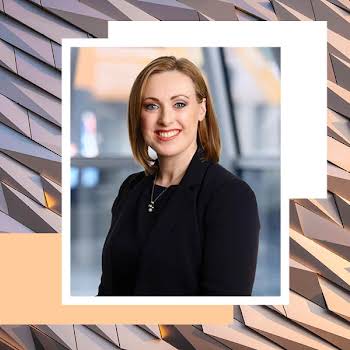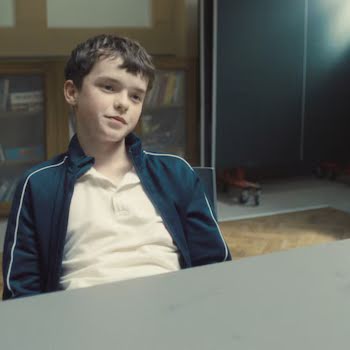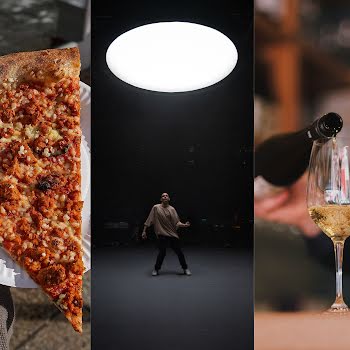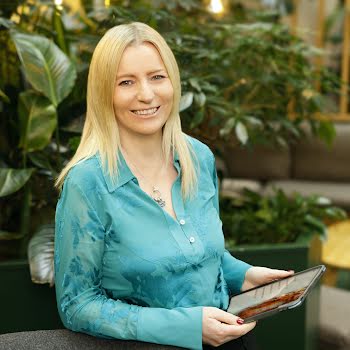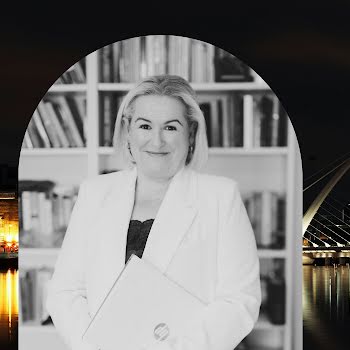
If you learn anything this week, make it the work/life wisdom of Dr Anita Sands
By Lucy White
18th Nov 2020
18th Nov 2020
Today was day one of the Image Business Summit. Here at Image we are feeling inspired and ready for the wisdom that day two promises. One of the speakers we are most excited about hearing from tomorrow is Dr Anita Sands, and after you read this, you’ll understand why. You can still purchase tickets for the Image Business Summit. All Summit delegates will have access to all talks for two weeks after the event. Ticket sales close tomorrow (Thursday) at 5pm.
Swapping Termonfeckin for Silicon Valley, Dr Anita Sands knows a thing or two about high-achievement. She holds a PhD in atomic and molecular physics, a Master’s in public policy and management, and spent ten years in financial services in California before building up a major boards portfolio there.
In our interview with Dr Sands, ahead of speaking at the IMAGE Business Summit this Thursday (November 19), she talks navigating career uncertainties, workplace gender inequality, American politics and how not to lead a public health crisis.
That 2020 has been tumultuous is an understatement. When we’re not pivoting, we’re upskilling, to try and future-proof our careers. What else can we do as individuals to steady the ship?
Rather than having the image of trying to “steady the ship” I think more about “steadying the captain,” so that you’re in the best possible shape to navigate whatever choppy waters come your way. Resilience, after all, isn’t about having the ability to bounce back, it’s about having the ability to bounce forward and upward.
I also like the analogy of life and leadership being like a surfer – what you’re always trying to do is position yourself on the front edge of the wave so that you can catch it and use it to propel you forward, rather than allowing it to crash over you. So it’s not about being future-proof, but rather future-fit.
What does that require? At its core, it requires the ability to remain curious – to go into every day, every year, every chapter of your life with your mind, eyes, ears, heart wide open to the possibilities. Being open to all the things you stand to gain, rather than grieving what you’ve lost.
It also requires you to have firm ground under your feet. This means doing the little things that give you back your equilibrium, your sense of feeling centred and steady. That can be as little as taking the time to have a shower and do your hair, getting out for a 20-min walk or taking five minutes to fill out a gratitude journal. We each have those little routines that give us a sense of comfort and strength and it’s important to know what they are.
Purchase tickets for the Image Business Summit
You worked for four major banks in North America before, during and after the financial crisis of 2008. What lessons must we apply to the covid recession?
The incredible thing about any crisis is that slivers of it are like things we’ve experienced before. The design firm IDEO has this beautiful expression where they talk about “Vu-ja-de”, rather than “De-ja-vu,” meaning that we want to look at things that are familiar and where prior knowledge and experience serves us well, but also approach things with a beginner’s mindset so that we can remain open and curious about all the new things we stand to learn and gain.
Our founder at ServiceNow – one of the boards I serve on – Fred Luddy, said at the beginning of all this: “Things are going to be different, not because of an invisible virus, but because of what we’ve learned.” For example we were propelled into this mass social experiment in the feasibility of working from home, and there are profound learnings and implications arising from that.
The US election has shown that policy vs science has never been more divisive. How do you see a way of bridging the gap between conspiracy theorising and fact-based public health?
It pains me to see how a medical, public health and very much socio-scientific issue such as the Covid crisis has become politicised, particularly here in the United States. And, unfortunately, the outcomes speak for themselves.
In terms of what Ireland can learn from America’s response to the pandemic, I think it’s a pointed lesson in what not to do. It’s also clear this year that nature hates a vacuum and when there’s a leadership vacuum – be it in the public or private sphere – that vacuum gets filled in all manner of sub optimal ways.
Purchase tickets for the Image Business Summit
I think leaders such as Jacinda Ardern in New Zealand have handled it exceptionally well. And while it would be easy to dismiss that country’s handling of it by saying it’s a remote island and geographically advantaged by that, on the other hand the country has a population of about 4.8m and yet welcomed 3.8m tourists in 2019. So having the economy open to tourism is a huge deal for them. Her approach was commendable relative to her transparency, empathy, communication and direction-giving, compared to others who peddled in fear and confusion.
I also admire the way she created a sense of national purpose around New Zealand’s response. She called upon the “team of five million” and asked each citizen to embrace the mission saying, “the actions of every New Zealander is responsible for the survival of the rest” – an empowering proposition in which everyone could play a part. So, in terms of response, I’d much rather see Ireland continue to be closer to the New Zealand end of the spectrum than the US.
And now to gender disparity. At the time of writing, women in Ireland are effectively working for free for the rest of the year, thanks to the gender pay gap. This is on top of aggregated data that shows the pandemic has had a disproportionately adverse affect on women. How do we begin to tackle this imbalance?
I’m not as familiar with the Irish statistics, but in the US women have been graduating at the same or greater rate as men for decades and yet still have a notable gender pay gap. I’ve been glad to see prominent CEOs, such as Dan Schulman (Paypal) and Marc Benioff (Salesforce) step up and take corrective measures to address it. At ServiceNow, we’ve committed to doing regular “pay equity audits” as we don’t feel you can ask someone to bring the fullest of their capabilities to work every day and then pay them for a fraction of that effort relative to someone else.
These problems are not new. We knew they existed, but crises are notorious for surfacing all kinds of inequalities. Any vulnerabilities or fault lines in our lives, or business, or even society that existed at the outset of the crisis, have now cracked wide open. And now that these issues have been brought to the forefront, it’s imperative we look to address them.
If, as a working mother, you were already stretched with work, household duties and/or caregiving, then this year has exasperated all those pressures. It drains your resources and challenges you on an entirely different level. So women are feeling burned out and are putting their hands up and saying that. Therefore we have to look at the tapestry of support that we’ve woven around these women and do what’s needed to fix and strengthen it.
I’m a big fan of the concept of “target universalism,” which I wrote about in a recent Forbes article. It’s the idea that we can have a universal goal, eg flexible work conditions for everyone, but then targeted strategies for how we implement it, depending on the needs of various cohorts.
Purchase tickets for the Image Business Summit
Studies reveal that men are far more likely than women to apply for jobs they’re not qualified for and therefore fulfill more senior roles. Meanwhile, women take each and every spec literally and discount themselves when they don’t seem to measure up. What is the solution here?
For many women, imposter syndrome unfortunately drives their thought process and actions when it comes to applying for a job. We all have that “roommate in our mind,” who’s up there, nattering non-stop, trying to make us doubt ourselves. When you peel it back, all fears boil down to two kinds: of not having enough or of not being enough.
So women look at a job spec and think, I don’t check every box, but rather than going for it, that fear of not being enough kicks in. And the insidious thing about this “roommate” is that she’s conditioned us so well that we’re in that state of fear almost by default. You don’t even realise it’s happening. There may be all kinds of flaws in the recruiting process, but we also place this great big “invisible hand” on ourselves.
Can organisations do better to address this?
They can do a lot to avoid this set up when it comes to job applications. I recall one of my organisations was hiring for a C-suite role and in putting the spec together, they solicited the input of the entire executive team as to what the ideal candidate should have, or be. By the time they captured everyone’s input, the job spec was so multi-varied that they were basically looking for a unicorn.
We need to check for this type of unconscious bias. Specs that are lengthy are often the result of multiple inputs but you have no idea the relative weighting of the criteria, or if the two out the ten that you don’t have matter that much. I encourage companies to keep specs concise, and that way you’ll open the aperture to more candidates.
We also need to be mindful of loaded or absolute terms such as “expert” or “must have,” because these phrases can cause candidates, namely women, to rule themselves out, when they could in fact be perfectly qualified.
On a more personal note, I am exhausted, frankly, just reading about your myriad achievements while co-parenting six children. To whom do you owe this extraordinary work ethic and enthusiasm?
Well, to be fair, relative to the six children, as I like to say, it was “a merger and acquisition”. My husband John was a widower when we met, and had five millennial children. We then got married and had a daughter. So what was once a relatively simple life of just me and my career, overnight (it felt like) was changed. I found myself a wife, mother, a stepmother and a step-grandmother. But I wouldn’t trade it for the world. They give me my fuel and my sense of purpose.
Purchase tickets for the Image Business Summit
I have a friend [Tiffany Dufu] who wrote this great book called Drop the Ball. It’s a guide to how women can “do it all” and when she’s asked about the reasons for her success, she says, “it’s simple, I expect far less of myself, and far more of my husband, than most other women.” I love that!
I will say that as this year unfolded, I spent most of it studying how to “Thrive in Ambiguity”. I wanted to know who does this well and ended up working with some great folks in New Zealand who are now my partners in Propel Performance Group. Everything I’ve learned, I try to apply to myself each day. I focus on what strengthens me, and stay aware of what depletes me.
Two things are top of mind – the first being that “not a lot matters, but what matters, matters a lot”. This year has been a vivid reminder of what matters: health, family, time.
Speaking of which… Pre-Covid, you divided your time between Dublin, NYC and San Francisco. Do you miss the travel or are you grateful for the respite?
I’ve found I’m actually way more productive now I don’t have to travel as much for work. I can contribute well as a board director via Zoom and I don’t use two days either side of the meeting travelling. I see the value in face-to-face meetings and gatherings, but there’s a trade-off to that, too. So I understand why many folks are leaning towards hybrid strategies going forward.
The one thing I really miss is getting home to Ireland and seeing my family. I’ve lived in the US and Canada for 20 years and my Mam had a big birthday this year. I can safely say it was one of the most difficult days to be away from home so I’m looking forward to being able to travel to see family again. But I’m not missing all the work-related travel, some of which we can clearly do without.
Book your place on this year’s IMAGE Business Summit 2020, in partnership with PwC, which takes place online on November 18-19. Get your (virtual) seat alongside some of the world’s leading business figures, for two days of powerful discussions, interviews and masterclasses. Buy tickets here

Read more: Jewellery entrepreneur Chupi shares her remarkable lockdown journey
Read more: Meet the speakers for the inaugural IMAGE Business Summit
Read more: Our financial columnist offers advice on investing during a pandemic

